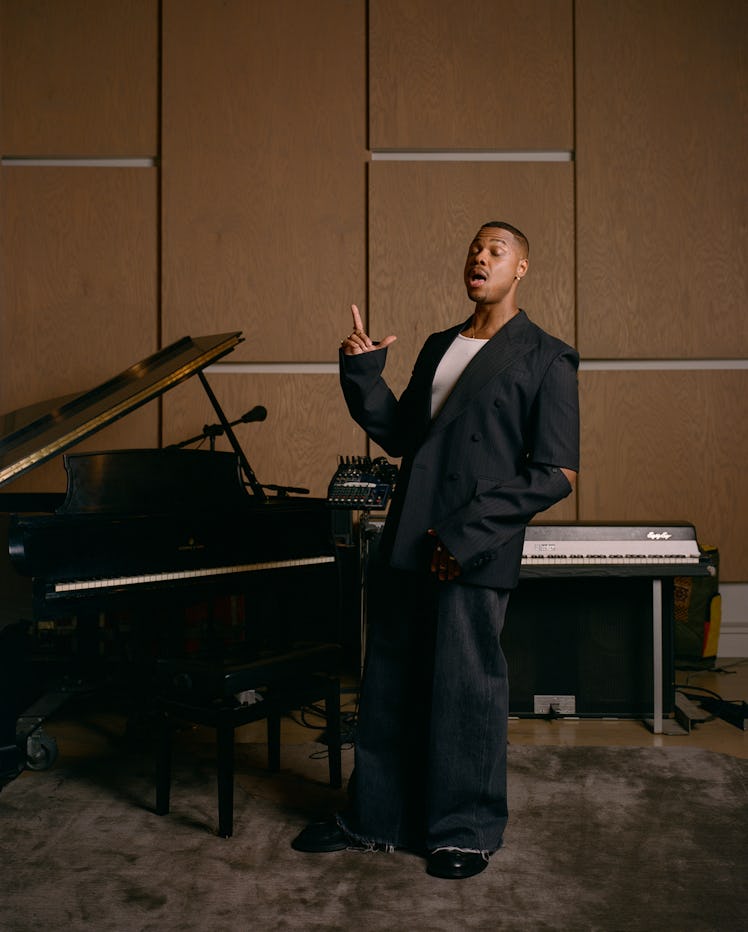Davóne Tines Goes Wherever the Music Takes Him

For W’s annual The Originals portfolio, we asked creatives—pioneers in the fields of art, music, food, dance, fashion, and more—to share their insights on staying true to themselves. See this year’s full class of creatives here.
At 36, you have established a reputation in classical music, experimental theater, and beyond as a singer who crosses boundaries—between genres of music and styles of performance. You also boast a full vocal range, from bass to above tenor. When did you recognize your love for music?
My earliest musical experiences were in the Black Baptist church. I remember being 8 years old, rolling on the floor because we’d been in choir rehearsal for four hours, and I wanted to enjoy the rest of Saturday. But it was amazing, because I was indoctrinated in music making that is all for a reason; there’s nothing that’s ornamental, nothing decorative. All music has a function, and that frame has stayed with me.
What was it like growing up as a Black gay boy in rural Virginia?
I was at the intersection of a lot of different groups—white and Black, and also economic diversity. My part of the family had a different economic profile through the hard work of my grandfather. He was the last of 14 children. His family was essentially stonemasons and sharecroppers who were the descendants of enslaved people. He enlisted in the Navy, and retired 30 years later from the Pentagon as a chief warrant officer. So through an incredible, immense amount of work, he changed how our family existed. I say now that I grew up in a Ralph Lauren ad on slave burial ground, because there was twilight polo on the weekends. And also my grandmother would drive me past my great-great-great-grandma’s cabin, on a plantation that is now a huge horse farm.
You’re wearing a black blazer over your bare chest, along with black shorts, pearl earrings, and Balenciaga rubber shoes. For past performances, you’ve worn pieces by Bode, Martine Rose, and Gucci and commissioned looks by rising designers like Jenny Lai and Brandon Murphy. How did you develop your fashion sense?
In fourth grade, I realized that clothes denoted class. If I wore a white polo shirt, I would be treated in a different way than if I wore a sweatsuit. I’m pretty happy I’ve achieved the uniform I was looking for. I know that with a particular costume, I’m signifying certain things that can travel through contexts. And, similarly, vocally I’ve continued to refine what I’m able to do with a classical voice and a technique that can shape-shift.
Balenciaga coat and trousers; his own earrings, necklace, and rings.
You majored in sociology as a Harvard undergraduate and then went to study music at the Juilliard School, where you’ve said you were expected to follow a preordained, conventional path. How did you break free?
I was really good at singing contemporary music because I had a background in violin and piano, so it gave me the musical chops to be able to sight-read and sing difficult music very quickly and easily. That gave me the ability to interpret new works by making them human, not alien or robotic. In school, I was assigned to sing this concert of early French music by Rameau. They asked me to do that because they knew I had an odd, broad range. The performance practice in the Juilliard early-music program was all about community, sharing ideas, very close listening and response, and that’s how that music actually happened. If you read those texts for what they are, they really are just open invitations to interpret, which is what I found the most freeing. I’ve always had a dear place in my musical heart for early Western classical music. It shows me that white culture has the possibility of communal engagement embedded within its own cultural practice. It gives me hope for the majority culture.
In 2019, I saw your galvanizing performance as the title character in a music theater piece based on Langston Hughes’s poem “The Black Clown.” More recently, you brought to the Ojai Music Festival, Carnegie Hall, and other leading venues the program “Recital No. 1: MASS,” your unconventional grouping of religiously imbued music, from Bach to spirituals. What’s next?
I just want to continue making work that’s honest. Right now, I’m working on “Recital No. 2.” I’ll be performing reimagined Sam Cooke music, and there’s also a Billie Eilish–inspired version of a bassy Brahms number. It’s about how love is scalable. If you can find how to love yourself, you can find how to love your community and the planet.
Does your career hinder your personal life?
What is personal life? My life is literally my work. People say, “You’ve got to find a hobby.” I am very blessed to do only things that I love. Otherwise, I simply wouldn’t or couldn’t do it. So I don’t have hobbies. My life is my hobby.
Grooming by Nigella Miller for Shiseido; fashion assistant: Sam Falb.
This article was originally published on